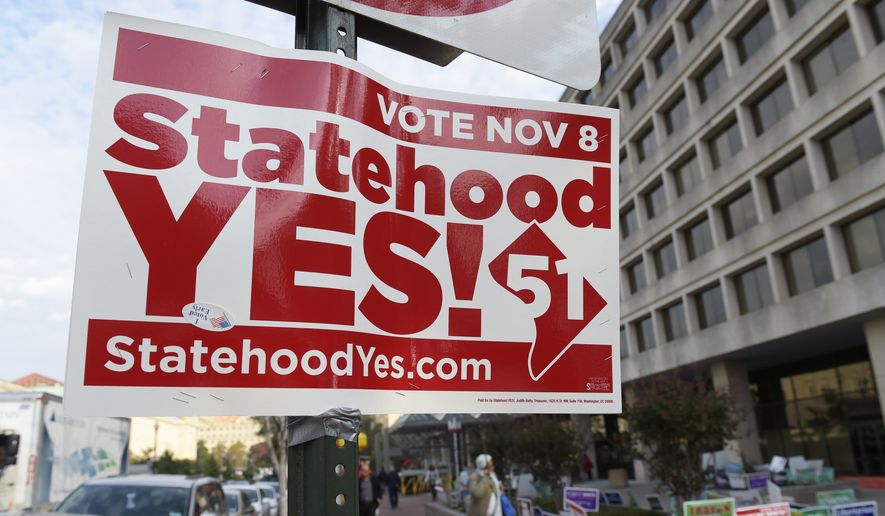If the Supreme Court could change its mind on same-sex marriage, then it can do the same for voting rights in the District of Columbia.
At least that’s the hope of activists who, two decades after the last major legal fight ended with the justices refusing to hear cases, are back to argue that what was done for the LGBTQ community can be done for 700,000 D.C. residents.
They have never won, at any level.
D.C. activists, though, say their cause is too justifiable to be ignored.
“There is no good rationale available anymore for denying the right to vote to people who live in the nation’s capital,” said Walter Smith, executive director at D.C. Appleseed Center for Law and Justice. “We are entitled to the vote.”
Mr. Smith was involved in the last legal fight, when a three-judge panel in the District ruled that the Constitution, which gives Congress the power to control a 10-square-mile district, prevents judges from intervening.
Besides, the court said, the Constitution says Congress is made up of lawmakers chosen “by the People of the several States.” The District is not a state.
The Supreme Court, in an 8-1 ruling, affirmed those conclusions in October 2000.
Mr. Smith said a number of things have changed.
For one, he said, both the House and Senate have passed — though never at the same time — legislation to grant D.C. residents at least some voting representation in Congress.
If both chambers of Congress believe the city deserves voting rights, then judges should agree, he said.
Mr. Smith has also been watching as lower courts rule against partisan gerrymanders, finding they dilute the voting power of residents.
“Our case is actually stronger than the gerrymandering cases because our vote is not merely diluted; it is destroyed completely. We have no vote at all,” he said.
The latest challenge, brought by 10 D.C. residents, also harnesses the Supreme Court’s ruling in the Obergefell case, a 2015 ruling that overturned its own precedent and found that same-sex couples had a fundamental right to marry.
Mr. Smith said the court recognized a fundamental right in Obergefell and extended it to a group of people who never had that right. He argued that due process affords D.C. residents a right to vote even though they have never had that power.
“The court has, in fact, said over and over again that the right to vote is fundamental,” Mr. Smith said.
The argument has some influential backers, including the League of Women Voters and the Democrat-controlled U.S. House.
“Let’s right this wrong because they are entitled to a fundamental right, and the right to vote is a fundamental right,” said Anne Anderson, chair of the Committee on Full Rights for D.C. Citizens.
Curt Levey, president of the Committee for Justice, said he doubts the new arguments will make much difference to the courts.
“It is for good reason that most supporters of D.C. voting rights realize they will need a constitutional amendment — similar to the one that gave D.C. three electoral votes — to achieve their objective,” Mr. Levey said.
Also, nothing in the Constitution defines marriage between one man and one woman, whereas the Constitution authorized a federally controlled capital, he said.
The city does have a delegate in the U.S. House — currently Eleanor Holmes Norton, a Democrat — who can participate in committee business but lacks a vote on bills and resolutions.
The District was created by Congress in 1791, when Maryland and Virginia donated land picked by George Washington. Yet until the seat of government moved from Philadelphia to the District in 1801, residents continued to vote in elections in those states.
Once Congress claimed jurisdiction in 1801, those rights ceased.
It was thought if residents needed to raise issues with Congress, they could easily walk to the Capitol to do so, said Jane Levey, chief historian at the Historical Society of Washington, D.C.
Adam Costanzo, a history professor at Texas A&M University, said Congress designated the District as a ward of the federal government so one state would have too much influence over laws and regulations.
“The idea of the people there being separate from the federal government isn’t one that was thought of going into it,” he said. “They sort of backed their way into a lot of things.”
Congress has relinquished some of its control in recent decades.
City residents gained the right to cast three votes for president in the Electoral College beginning in 1964 and held its first modern elections for city council and mayor in 1974.
• Alex Swoyer can be reached at aswoyer@washingtontimes.com.




Please read our comment policy before commenting.